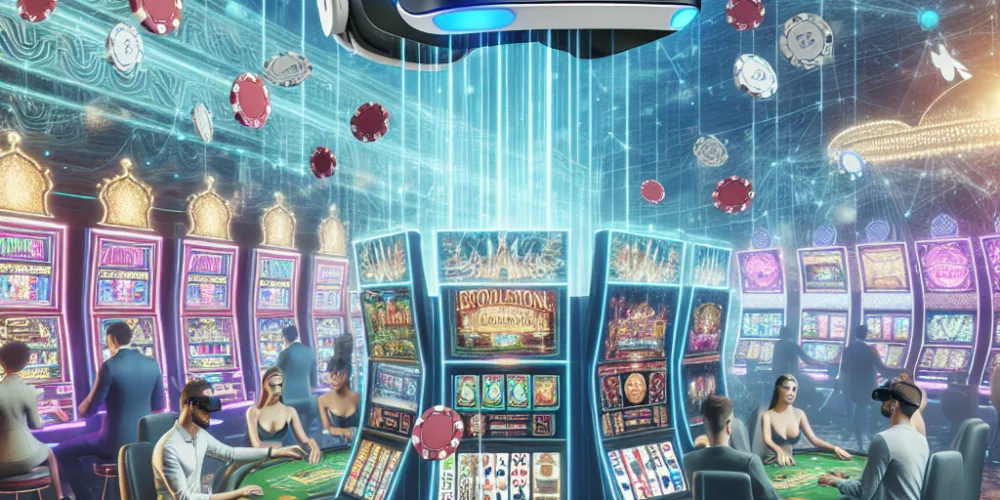In the ever-evolving world of entertainment, technology continues to push the boundaries of what’s possible. Among the thrilling advancements, the integration of Virtual Reality (VR) in the casino industry stands out as a game changer, redefining the gaming experience for enthusiasts around the globe. This transformation is not just about enhancement but revolution, as VR casinos begin to carve a niche within the gaming and gambling sectors.
The concept of VR casinos is to bring the immersive and engaging experience of a physical casino to the comfort of your home. Imagine donning a VR headset and finding yourself walking through the opulent lobby of a Las Vegas casino. With realistic slot machines, poker tables, and even interactions with other players, the virtual world mirrors the intense, thrilling atmosphere of a traditional casino, but without the travel expenses.
Technological advancements have enabled developers to create highly detailed and interactive environments. Companies like Oculus Rift, HTC Vive, and Sony’s PlayStation VR are spearheading these experiences, transforming how players engage with casino games. The realism doesn’t stop at graphics and gameplay; it extends to sound effects and game interactions that mimic real-life dynamics.
This innovation isn’t just good news for players. Virtual reality casinos offer numerous advantages to the business side of gaming. First, they open up the market to a broader audience, including those who might not be able to visit physical casinos due to geographical or physical constraints. VR casinos are also less costly to maintain than their brick-and-mortar counterparts, as they require no physical space other than the server infrastructure.
Moreover, VR casinos can implement a wide array of gaming options that might be impractical in a physical location due to space or cost restrictions. From VR slots to immersive versions of blackjack and roulette, players can experience a vast variety of games. Advanced VR platforms are even exploring live dealer games, where players can interact with a human dealer in a virtual space, further enhancing the realism.
However, the rise of VR casinos also presents challenges. Regulatory issues are a significant hurdle, as the legal landscape for online gambling is complex and varies by jurisdiction. Ensuring fair play and preventing the misuse of personal data are also paramount concerns that developers need to address. These challenges require innovative solutions and robust frameworks to ensure that the growth of VR casinos is sustainable and ethical.
Player adaptation is another critical factor. Traditional gamers and gamblers might need time to adjust to this new mode of playing. Furthermore, the cost of VR headsets and the required hardware to run them effectively could be a barrier for some potential users. Nonetheless, as technology progresses and becomes more affordable, these issues are likely to diminish, making VR casinos more accessible to a broader audience.
The social aspect of VR casinos also holds significant potential. In a world where social distancing has become part of daily life, VR casinos offer a venue for interaction and entertainment that can fill the void left by limited physical social interactions. Features that allow players to communicate and engage with each other in the virtual world could help forge a new community of casino enthusiasts.
The future of VR casinos could also see integration with other forms of entertainment. Cross-platform functionalities, such as combining video gaming elements with gambling experiences, could attract a new demographic of users and keep the platform dynamic and engaging.
In conclusion, as we look forward, the integration of virtual reality into the casino industry is not just an expansion but a significant evolution. It promises to enhance user experience dramatically, tackle accessibility issues, and open new avenues for engaging with gambling and gaming. With ongoing technological advancements and decreasing costs, the potential for VR in casinos is boundless. As this exciting industry continues to develop, it will undoubtedly become a vital component of the gaming and gambling ecosystem, offering players around the world a new and thrilling way to play.

Karine Gomez is an enthusiastic writer and avid gamer with a particular love for PlayStation and casino gaming. Her deep knowledge of gaming trends and casino dynamics makes her articles both informative and engaging. Karine’s passion for PlayStation games and her firsthand experience with casino play shine through in her writing, offering readers authentic insights and valuable tips.

